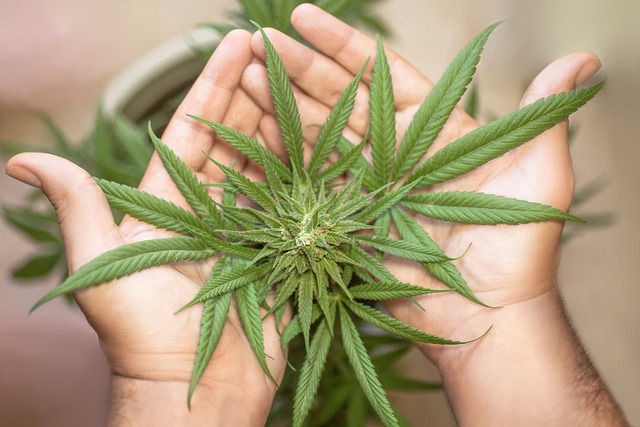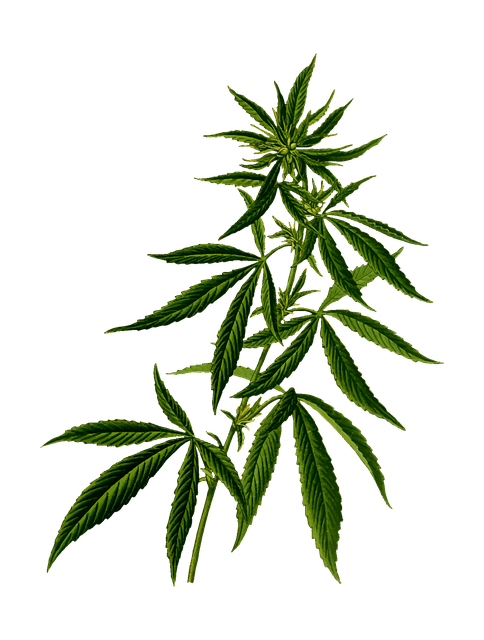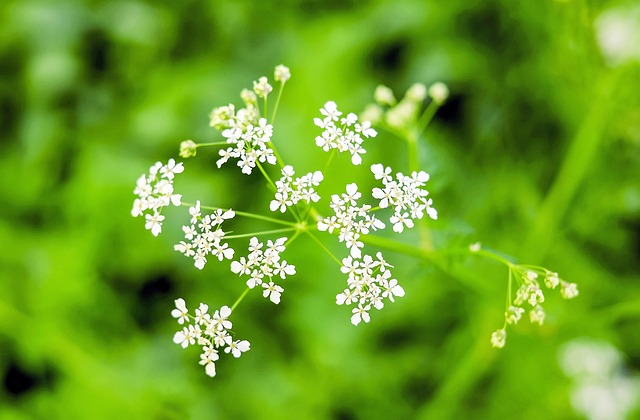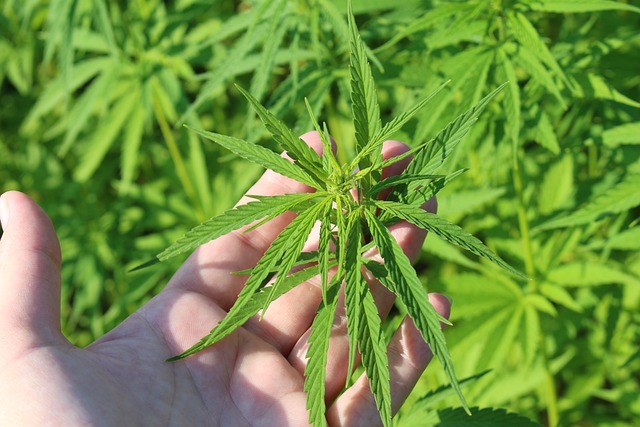The THCA flower, a non-psychoactive derivative of cannabis, has garnered attention for its potent anti-inflammatory properties, which are leveraged through various consumption methods such as smoking, vaporizing, or ingesting it in teas and smoothies. Unlike its psychoactive counterpart THC, THCA interacts with the endocannabinoid system by binding to CB1 and CB2 receptors, offering relief from inflammation without mind-altering effects. Clinical studies indicate that THCA can inhibit pro-inflammatory cytokines and enzymes, making it a promising option for managing conditions like arthritis, skin disorders, and gastrointestinal issues. Its therapeutic benefits are under investigation for its potential to modulate immune responses and provide a natural alternative to traditional inflammation treatments. The THCA flower is gaining recognition for its role in holistic health practices, with its legal status varying by jurisdiction, necessitating compliance with local laws. As users explore the anti-inflammatory effects of THCA flower, it is imperative to start with a low dosage and consult healthcare professionals, especially for those with pre-existing health conditions or who are on other medications. Ensuring product purity from reputable sources is crucial for both safety and effectiveness.
Explore the natural prowess of THCA flower, a budding resource in the realm of anti-inflammatory wellness. This article delves into the multifaceted benefits of THCA flower, elucidating its scientifically supported properties and potential for alleviating inflammation. From understanding how it works to integrating it into your daily health regimen, discover the therapeutic applications of THCA flower for various inflammatory conditions. Additionally, navigate the complexities of legal considerations and safety measures to harness its anti-inflammatory effects responsibly. Join us as we examine the thca flower’s role in promoting holistic health and wellness.
- Unveiling THCA Flower: A Natural Approach to Anti-Inflammatory Wellness
- The Science Behind THCA Flower's Anti-Inflammatory Properties
- THCA Flower as a Holistic Remedy for Inflammation-Related Conditions
- Potential Therapeutic Applications of THCA Flower for Inflammatory Diseases
- How to Incorporate THCA Flower into Your Wellness Routine
- Navigating Legalities and Safety Considerations When Using THCA Flower for Anti-Inflammatory Benefits
Unveiling THCA Flower: A Natural Approach to Anti-Inflammatory Wellness

Cannabis, particularly in its natural form as THCA (Tetrahydrocannabinolic Acid) flower, has garnered attention for its potential health benefits, with a particular focus on its anti-inflammatory effects. The THCA flower, which is the raw, non-psychoactive precursor to the psychoactive THC found in cannabis, contains a range of compounds that may contribute to reducing inflammation within the body. Research suggests that THCA interacts with the body’s endocannabinoid system, influencing the CB1 and CB2 receptors associated with pain sensation and immune response, thereby offering anti-inflammatory properties without the psychoactive side effects typically linked with its decarboxylated form, THC.
Advocates of the THCA flower highlight its potential as a natural alternative for those seeking relief from inflammation-related conditions. Unlike synthetic drugs that may come with a host of side effects, the THCA flower offers a holistic approach to wellness. Its anti-inflammatory effects are believed to be particularly beneficial for individuals experiencing symptoms related to arthritis, multiple sclerosis, and other inflammatory disorders. The unique composition of cannabinoids, terpenes, and flavonoids in the THCA flower contributes to its therapeutic potential, making it a subject of growing interest in natural health circles. Users often report that incorporating THCA flower into their wellness regimen helps manage pain and inflammation more effectively when compared to other interventions they have tried. As research continues to evolve, the role of THCA flower in promoting anti-inflammatory wellness becomes increasingly clear, offering a promising avenue for natural health solutions.
The Science Behind THCA Flower's Anti-Inflammatory Properties

The THCA flower, which is rich in tetrahydrocannabinolic acid (THCA), possesses a range of potential health benefits, with its anti-inflammatory effects being particularly noteworthy. THCA, the non-psychoactive precursor to THC, interacts with the body’s endocannabinoid system through its engagement with cannabinoid receptors such as CB1 and CB2. This interaction is pivotal in modulating inflammatory responses. Studies have indicated that THCA can inhibit certain pro-inflammatory cytokines and enzymes, which are often implicated in various inflammatory conditions. These findings suggest that THCA flower may offer a therapeutic approach to managing symptoms associated with inflammation-related disorders without the psychoactive effects typically found in its counterpart, THC. The anti-inflammatory properties of THCA are believed to stem from its ability to influence immune responses and reduce the activity of certain molecules that contribute to inflammation. This makes THCA flower an object of interest for researchers and individuals seeking natural alternatives for managing inflammatory conditions, including those related to arthritis, skin ailments, and gastrointestinal issues.
THCA Flower as a Holistic Remedy for Inflammation-Related Conditions

The THCA flower, rich in tetrahydrocannabinolic acid (THCA), exhibits potent anti-inflammatory effects that have garnered attention for its holistic therapeutic potential. THCA, the precursor to THC found in cannabis plants, interacts with the body’s endocannabinoid system, modulating inflammatory responses without the psychoactive properties of its counterpart, THC. Studies indicate that THCA possesses anti-inflammatory properties that can be beneficial for various inflammation-related conditions, such as arthritis and chronic pain syndromes. Its efficacy in alleviating symptoms like joint pain and swelling is attributed to its ability to inhibit certain pro-inflammatory cytokines and enzymes involved in the inflammatory cascade. As a result, the THCA flower may offer a safe and effective alternative or adjunct treatment for those seeking natural ways to manage inflammation.
Furthermore, the anti-inflammatory effects of THCA are not limited to its topical application; when consumed, it can also mitigate systemic inflammation. This dual-action approach allows for both local and general inflammatory responses to be addressed, potentially leading to improved overall well-being for individuals suffering from conditions characterized by persistent inflammation. The non-psychoactive nature of THCA ensures that users can benefit from its therapeutic properties without the mind-altering effects associated with other cannabinoids. As research continues to evolve, the role of THCA flower in holistic health and wellness practices for inflammation-related conditions becomes increasingly clear, offering a promising avenue for natural relief and symptom management.
Potential Therapeutic Applications of THCA Flower for Inflammatory Diseases

delta-9-tetrahydrocannabinolic acid (THCA) is the non-psychoactive precursor to the well-known compound THC found in cannabis plants. Emerging research indicates that THCA possesses potent anti-inflammatory properties, which may be harnessed for therapeutic applications against inflammatory diseases. The flower form of THCA offers a direct avenue for these potential benefits, as it can be consumed through various methods such as smoking or vaporization, allowing for precise dosing and rapid onset of effects. Preclinical studies have demonstrated that THCA interacts with the body’s endocannabinoid system, particularly the CB2 receptors, which are known to play a role in modulating immune responses and reducing inflammation. This interaction could be pivotal in managing conditions like rheumatoid arthritis, inflammatory bowel disease (IBD), and multiple sclerosis, where chronic inflammation is a hallmark. Further research is warranted to elucidate the full spectrum of THCA flower’s anti-inflammatory effects and its potential as an adjunct or alternative therapy for inflammatory diseases, with the aim of providing effective, plant-based treatment options for patients.
How to Incorporate THCA Flower into Your Wellness Routine

Including THCA (Tetrahydrocannabinolic Acid) flower in your wellness routine can be a natural way to harness its potential anti-inflammatory effects. THCA is the raw, non-psychoactive form of THC found in raw cannabis plants and has been studied for its therapeutic properties. To incorporate THCA flower into your daily wellness regimen, consider incorporating it through infusions or direct consumption. For example, you can brew a tea by steeping dried THCA flower in hot water, allowing the beneficial compounds to infuse into the beverage. This method is gentle and can be a part of your morning or evening routine for its potential soothing properties. Alternatively, THCA flower can be added to smoothies or juices for a more palatable experience, combining its anti-inflammatory effects with other healthful ingredients. When preparing the flower, it’s important to handle it carefully and to purchase high-quality, lab-tested products from reputable sources to ensure safety and efficacy. Additionally, those interested in the potential benefits of THCA for joint comfort or overall inflammation response may find that including a consistent dose of THCA flower as part of their wellness routine could be beneficial. As with any health regimen, it’s advisable to consult with a healthcare professional before making significant changes to your routine, particularly if you have underlying health conditions or are taking other medications.
Navigating Legalities and Safety Considerations When Using THCA Flower for Anti-Inflammatory Benefits

Navigating the legalities surrounding THCA flower usage is a critical first step for individuals interested in its potential anti-inflammatory effects. The legality of THCA flower varies by jurisdiction, with some regions allowing its use for medical purposes and others for recreational use as well. It’s imperative to understand the legal status in your area before purchasing or consuming THCA flower. Compliance with local laws is not only a matter of adherence but also ensures safety and avoids potential legal repercussions.
Safety considerations are paramount when incorporating THCA flower into one’s wellness routine for its anti-inflammatory benefits. THCA, or Tetrahydrocannabinolic Acid, is the raw form of THC and has been studied for its potential health advantages, including its anti-inflammatory properties. To safely harness these benefits, it’s advisable to start with a low dosage to gauge individual sensitivity and effects. Consultation with a healthcare provider is recommended, especially for those with existing health conditions or taking other medications. Additionally, sourcing THCA flower from reputable dispensaries or suppliers can mitigate the risk of contamination or mislabeling, which are important factors for ensuring product safety and efficacy.
THCA flower emerges as a promising natural alternative for those seeking anti-inflammatory relief. Its potential benefits, rooted in scientific evidence and supported by holistic wellness practices, suggest that it could be a valuable addition to managing inflammation-related conditions. The therapeutic applications of THCA flower warrant further investigation, particularly for individuals with inflammatory diseases. To harness its anti-inflammatory effects, incorporating THCA flower into a well-rounded health routine may offer benefits. However, it is imperative to navigate legal guidelines and prioritize safety when exploring this natural remedy. As research continues to unfold, the role of THCA flower in healthcare remains an exciting area of development.
